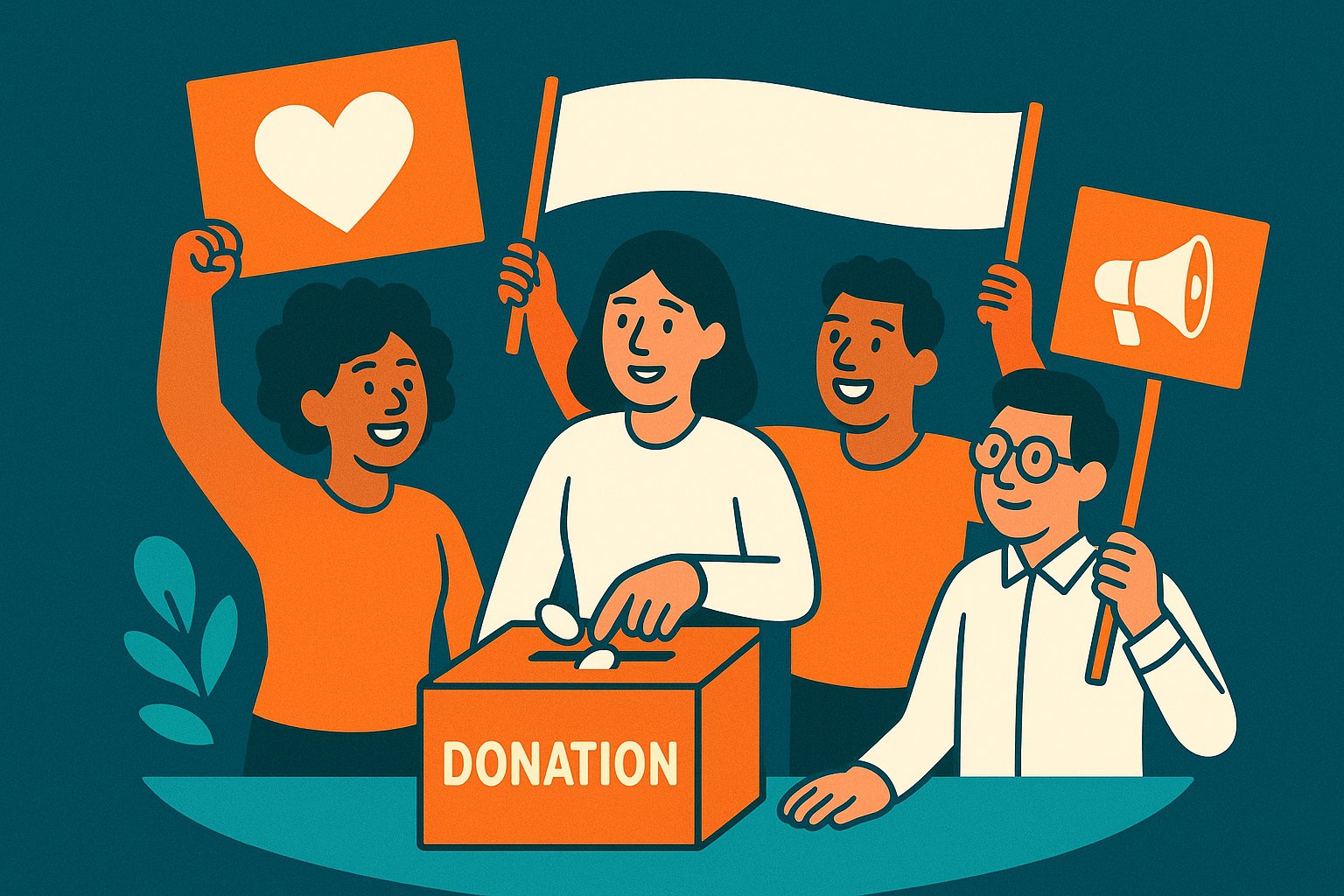Setting the Stage for Respectful Collaboration
In the dynamic world of crowdfunding, donation drives, and philanthropic campaigns, establishing a foundation of mutual respect between donors and campaign organizers is not just polite—it’s essential. Donor etiquette encompasses the actions and attitudes that reflect genuine support, clear communication, and shared purpose. When well-intentioned supporters approach campaign organizers with a spirit of collaboration and understanding, they foster an environment where creativity thrives, trust is reinforced, and transformational impact becomes possible. By learning to engage thoughtfully—whether through asking clarifying questions, offering constructive feedback, or simply expressing gratitude—donors can amplify the effectiveness of a campaign while deepening their own sense of fulfillment.
Why Thoughtful Communication Matters
Effective communication is at the heart of any successful partnership. Campaign organizers invest countless hours crafting messaging, building communities, and troubleshooting logistical hurdles. When donors approach with clear, concise inquiries, it streamlines decision-making and minimizes misunderstandings. For instance, instead of sending a vague email asking, “How’s the project going?”, a respectful donor might ask, “Could you share an update on the timeline for the new outreach initiative you mentioned last month?” This type of inquiry demonstrates that you have been paying attention, that you respect the organizer’s time, and that you seek specific information rather than vague reassurance. Using precise language not only speeds up the exchange but also helps organizers prioritize their responses effectively.
Crafting Polite Inquiries
All too often, well-intentioned supporters inadvertently overwhelm organizers with open-ended questions or requests that lack context. To avoid this, spend a moment before reaching out to clearly define what you need to know. If you are curious about how your donation will be allocated, specify whether you are asking about general budget categories—such as marketing, operations, or materials—or whether you want details about a particular line item. Phrase your request using appreciative language: “I’m excited about this campaign’s potential impact. Could you please clarify how the recent contributions will be allocated toward educational materials versus outreach events?” This approach signals genuine interest in the cause and provides organizers with the context they need to respond comprehensively, reducing back-and-forth exchanges.
Balancing Questions with Patience
While clarity is crucial, it must be tempered with patience. Campaigns often juggle multiple moving parts—social media updates, financial reporting, volunteer coordination, and partnership outreach. If you send a detailed query, consider that organizers may need time to compile accurate information, especially if they are fielding questions from multiple supporters simultaneously. Avoid pressuring them with repeated “just checking in” follow-ups within short intervals. Instead, set your own mental timeline: if you haven’t heard back in a week or ten days, send a polite nudge that acknowledges their workload: “I understand you have many demands on your time. Whenever you have a chance, I would appreciate any insights you can share on the community engagement plan.” This courteous attitude underscores that you value their efforts as much as you value receiving timely information.
Recognizing Workload and Boundaries
Every campaign—whether grassroots or backed by a large nonprofit—operates within constraints of budget, human resources, and time. Recognizing these constraints is a hallmark of exemplary donor etiquette. Refrain from making demands that fall outside the scope of what organizers can realistically deliver. For example, requesting highly detailed audits of expenditures at the drop of a hat can be counterproductive, especially if the project is still in its early stages and formal accounting processes are not yet in place. Instead, inquire about when financial reports are typically released or how frequently organizers plan to publish updates. By aligning your expectations with realistic timelines, you demonstrate empathy for their workload and avoid creating unnecessary tension.
Offering Resources, Not Just Funds
Beyond financial support, many organizers welcome in-kind contributions, skill-based volunteering, or introductions to strategic partners. Before extending an offer, verify whether it aligns with the campaign’s goals and capacity. Rather than asserting, “I’m an expert in event planning; let me handle your next fundraiser,” consider phrasing: “I have a background in event logistics and would love to help if your team could use an extra hand. Are there any aspects of the upcoming community event where my involvement could add value?” This way, organizers feel supported—rather than sidelined—and can designate tasks that genuinely make sense. The key is to remain flexible and open to direction, trusting that they know what will be most beneficial.
Appreciating Different Communication Styles
Every organizer has a preferred mode of communication—some favor email, others prefer phone calls, and many rely on dedicated project management tools or social media channels to coordinate efforts. Before reaching out, try to determine whether the campaign website specifies a contact method. If multiple channels are available, choose the one that appears most formal or frequently updated. If the campaign’s newsletter suggests using a specific email for donor inquiries, adhere to that protocol. By respecting these preferences, you signal that you’ve already done your homework and are serious about honoring the team’s processes. Should you inadvertently use an incorrect channel, acknowledge the oversight and pivot gracefully: “I realize this message may be better suited for the official donor support inbox. My apologies—please let me know if I should redirect this to a different email address.”
Providing Constructive Feedback
Engaged donors sometimes have ideas on how to improve campaign messaging, outreach strategies, or community engagement. While fresh perspectives can be valuable, it’s crucial to present feedback in a way that underscores respect for the organizer’s expertise and vision. For instance, rather than declaring, “Your website design is confusing,” consider softening the critique: “I appreciate the effort that went into the website, and I noticed that some users in our network mentioned difficulty locating donation links. Could we explore potential tweaks to improve navigation?” This phrasing validates the organizer’s efforts while framing feedback as a collaborative opportunity. In addition, it invites them to accept your input without feeling attacked, thereby facilitating constructive dialogue.
Respecting Confidentiality and Privacy
Campaigns often share sensitive information with key supporters—projected budgets, partnership negotiations, or volunteer contact lists. It’s imperative to handle such information discreetly and to refrain from sharing it without explicit permission. If you intend to discuss campaign details with colleagues or post updates on social media, first verify whether the organizer has guidelines about confidentiality. A respectful donor might write: “Thank you for sharing the upcoming sponsorship proposal. Would it be okay if I shared the overview with my professional network, or do you prefer to keep this information internal until formal agreements are in place?” This demonstrates an awareness of privacy concerns and shows that you understand the difference between being supportive and overstepping boundaries.
Timing Your Engagement Thoughtfully
Understanding the campaign’s lifecycle can help you choose the optimal moment to connect. Many fundraisers experience surges of activity during launch, mid-campaign momentum pushes, and final push phases as deadlines loom. While it’s tempting to send questions or suggestions during a lull, consider deferring certain inquiries to moments when organizers are less besieged. For example, immediately after the campaign launch, teams may be inundated with media requests, urgent technical fixes, and initial donor acknowledgments. If your question is not time-sensitive, wait for the mid-campaign period when organizers often evaluate progress and plan the next set of milestones. This approach not only maximizes the likelihood of getting a thorough response but also conveys that you appreciate the ebb and flow of campaign demands.
Expressing Genuine Appreciation
All too often, donors focus so intently on tangible outcomes—metrics, milestones, deliverables—that they overlook the power of a heartfelt “thank you.” Sending a brief email, handwritten note, or social media shout-out can boost morale and reinforce the sense that every contribution, financial or otherwise, is valued. Aim to be specific when expressing gratitude: instead of a generic “Thanks for all you do,” try “Thank you for your detailed update last week on volunteer engagement. Learning about how our contributions are fueling local workshops really inspired me to share this campaign with my network.” Specificity shows that you’re paying close attention, and it motivates organizers to continue providing transparent updates, ultimately benefiting everyone involved.
Navigating Differences in Expectations
At times, a donor’s vision for a campaign’s impact may differ from the organizer’s original plan. While passionate support can drive innovation, it also risks creating friction if expectations are not aligned. If you find yourself diverging from the organizer’s priorities—say, you want more emphasis on social media outreach while they are focusing on local community events—initiate a respectful conversation. A balanced approach might be: “I’m excited about the face-to-face community events you’ve been organizing. At the same time, I believe amplifying this work on Instagram and TikTok could attract younger supporters. Could we discuss how social channels might complement your strategy?” This way, you’re not undermining their efforts but inviting a strategic discussion that might lead to productive synergy.
Maintaining Transparency and Honesty
Authenticity is a cornerstone of respectful engagement. If your circumstances change—perhaps a promised donation needs to be postponed or you find a conflict of interest—alert the campaign organizer as soon as possible. For instance, sending a message like, “Due to unexpected expenses this month, I might need to delay my donation by two weeks. I value this campaign and didn’t want to leave you guessing,” safeguards trust. Organizers facing tight budgets and timelines need accurate information to plan effectively; knowing there may be a temporary shortfall allows them to adjust budgets, seek interim resources, or shift timelines accordingly. By being transparent, you avoid inadvertently causing logistical headaches and demonstrate integrity in your philanthropic partnerships.
Adapting to Cultural and Organizational Norms
Different campaigns operate within diverse cultural or organizational contexts—some may prioritize formal introductions and official titles, while others embrace a casual, peer-to-peer ethos. Before reaching out, take note of how the organizer refers to themselves, how they address support teams, and what tone they strike in public communications. If the campaign’s website uses a formal voice (“Dr. Johnson leads our initiative”), mirror that formality in subject lines and salutations (“Dear Dr. Johnson” or “Hello, Dr. Johnson”). Conversely, if the project’s social channels use first names and emojis, it may be acceptable to adopt a warmer, more conversational tone. Observing and adapting to these cultural nuances shows respect for the organizer’s identity and fosters smoother interactions.
Celebrating Milestones Together
Donor etiquette is not only about what you ask or how you request information—it’s also about celebrating wins. When a campaign reaches its halfway point, hits a fundraising goal, or launches a new community initiative, publicly acknowledge these milestones. Share updates on your social media channels (while attributing credit to the organizer), send a congratulatory note, or organize a small recognition event among your personal network. Such gestures elevate the entire community behind the campaign and strengthen interpersonal bonds. Remember, even a brief acknowledgment—“Congratulations on surpassing $50,000 in donations! The ripple effects of this are already visible in the local community gardens”—reinforces the idea that you are an invested, enthusiastic partner rather than a passive contributor.
Cultivating Long-Term Partnerships
Respectful engagement doesn’t end once a campaign concludes. If an organizer invites feedback through post-campaign surveys or debrief sessions, participate thoughtfully. Share observations—not only about successes but also about areas for improvement—in a collaborative spirit: “I appreciated how your team hosted virtual town halls, but I noticed some technical glitches in the live stream that might have discouraged late joiners. Would you consider platform alternatives for future events?” Such constructive, solution-oriented feedback signals that you remain committed to the organizer’s long-term success. By offering to stay involved—perhaps as an advisor, volunteer, or ambassador—you transition from a transactional donor to a strategic ally who helps steward future endeavors.
Sustaining Respect Beyond the Campaign
As the campaign winds down and new initiatives emerge, continue to uphold the principles of open communication, patience, and gratitude. When new organizers take the reins, extend a gracious introduction: “I’m a returning supporter from the previous year’s initiative. I admire the work done under your leadership and look forward to seeing how this new chapter unfolds.” Expressing curiosity about their vision demonstrates that you value continuity and are invested in the evolving mission. Whether organizing holiday fundraisers, capacity-building workshops, or legacy giving programs, the same etiquette that nurtured your initial partnership can pave the way for deeper, enduring relationships.
The Ripple Effect of Respectful Donorship
Ultimately, donor etiquette transcends mere courtesy—it serves as a catalyst for positive change. When donors engage thoughtfully with campaign organizers, they enable a more efficient use of resources, inspire greater creativity, and strengthen the social fabric that underpins every philanthropic endeavor. Respectful dialogue fosters trust, which fuels transparency and encourages more people to get involved. As donors and organizers cultivate mutual appreciation, the collective energy generated can propel campaigns to exceed their goals, reach untapped audiences, and leave a lasting impact on communities. By embracing the principles outlined—clear communication, patience, constructive feedback, and genuine gratitude—you become more than a financial contributor; you become a partner in change.
Charting the Path Forward with Gratitude
In a world where countless causes vie for attention and resources, the ability to stand out as a considerate, engaged donor is invaluable. By learning how to approach campaign organizers with thoughtfulness—balancing your curiosity with patience, offering support without overstepping, and expressing sincere thanks at every juncture—you not only enrich your philanthropic journey but also enhance the capacity of organizers to drive meaningful change. As you embark on your next contribution, remember that respect and collaboration are the lodestars guiding any successful campaign. With these principles firmly in mind, you can forge partnerships that do more than fund a project; they build communities, inspire collective action, and leave a legacy of compassion that resonates far beyond any single campaign.




